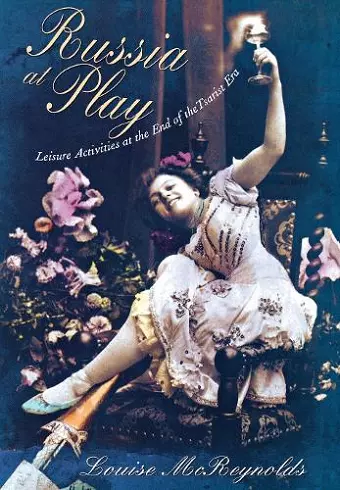Russia at Play
Leisure Activities at the End of the Tsarist Era
Format:Hardback
Publisher:Cornell University Press
Published:25th Nov '02
Currently unavailable, and unfortunately no date known when it will be back

An athlete becomes a movie star; a waiter rises to manage a chain of nightclubs; a movie scenarist takes to writing restaurant reviews. Intrepid women hunt bears, drive in automobile races, and fly, first in balloons and then in airplanes. Sensational crimes jump from city streets onto the screen almost before the pistols have had a chance to cool. Paris in the Twenties? Fitzgerald's New York? Early Hollywood? No, tsarist Russia in the last decades before the Revolution.
In Russia at Play, Louise McReynolds recreates a vibrant, rapidly changing culture in rich detail. Her account encompasses the "legitimate" stage, vaudeville, nightclubs, restaurants, sports, tourism, and the silent movie industry. McReynolds reveals a pluralist and dynamic society, and shows how the new icons of mass culture affected the subsequent gendering of identities.
The rapid industrialization and urbanization of the late tsarist period spawned dramatic social changes—an urban middle class and a voracious consumer culture demanded new forms of entertainment. The result was the rapid incursion of commercial values into the arts and the athletic field and unprecedented degrees of social interaction in the new nightclubs, vaudeville houses, and cheap movie houses. Traditional rules of social conduct shifted to greater self-fulfillment and self-expression, values associated with the individualism and consumerism of liberal capitalism.
Leisure-time activities, McReynolds finds, allowed Russians who partook of them to recreate themselves, to develop a modern identity that allowed for different senses of the self depending on the circumstances. The society that spawned these impulses would disappear in Russia for decades under the combined blows of revolution, civil war, and collectivization, but questions of personal identity are again high on the agenda as Russia makes the transition from a collectivist society to one in which the dominant ethos remains undefined.
First and foremost it is a recovery of little-known stories of Russian leisure activities, an effort to 'resurrect' what has largely 'vanished' from historical memory.... This recovery of the past is often quite celebratory (the author's pleasure in discovering and telling these tales of Russians 'at play' is apparent), yet this appreciation has interpretive weight. Louise McReynolds argues, against the well-known contempt for commercial entertainment by contemporary culturalist intellectuals, that Russia's growing commercial mass culture offered citizens facing a rapidly changing modern society much of value. Above all, it offered Russians opportunities to orient themselves as individuals and social beings, to fashion and adapt new identities, and to find refuge.
* Slavic Review *In her well-researched and stimulating book, Louise McReynolds brings firmly to our attention the late tsarist leisure industry and show show it can deepen our understanding of Russian culture and society.... The book also has more than fifty well-chosen illustrations: street scenes, sports photos, photo-portraits (especially of actors), cartoons, and promotional pictures of resorts.
* SE- Winner of Winner of the 2003 Norris Hundley Prize (Pacific C.
ISBN: 9780801440274
Dimensions: 235mm x 155mm x 25mm
Weight: 907g
320 pages